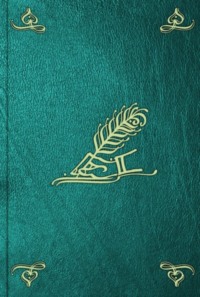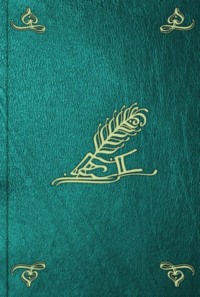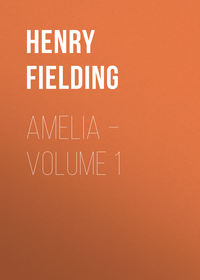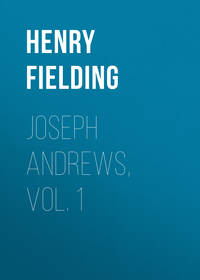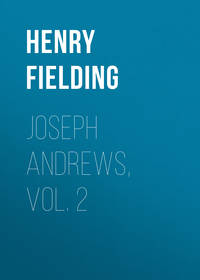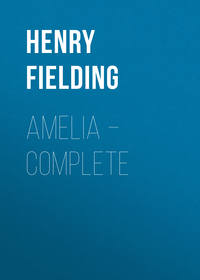 полная версия
полная версияThe Works of Henry Fielding, vol. 12
Luck. What the devil can he be?
Har. One of your old acquaintance, I suppose, in disguise – one of his majesty's officers with his commission in his pocket, I warrant him.
Luck. Well, but have you your part perfect?
Har. I had, unless this fellow hath frightened it out of my head again; but I am afraid I shall play it wretchedly.
Luck. Why so?
Har. I shall never have assurance enough to go through with it, especially if they should hiss me.
Luck. Oh! your mask will keep you in countenance, and as for hissing, you need not fear it. The audience are generally so favourable to young beginners: but hist, here is your mother and she has seen us. Adieu, my dear, make what haste you can to the playhouse.
[Exit.
SCENE X. – HARRIOT, MONEYWOOD
Har. I wish I could avoid her, for I suppose we shall have an alarum.
Money. So, so, very fine: always together, always caterwauling. How like a hangdog he stole off; and it's well for him he did, for I should have rung such a peal in his ears. – There's a friend of his at my house would be very glad of his company, and I wish it was in my power to bring them together.
Har. You would not surely be so barbarous.
Money. Barbarous! ugh! You whining, puling fool! Hussey, you have not a drop of my blood in you. What, you are in love, I suppose?
Har. If I was, madam, it would be no crime,
Money. Yes, madam, but it would, and a folly too. No woman of sense was ever in love with anything but a man's pocket. What, I suppose he has filled your head with a pack of romantick stuff of streams and dreams, and charms and arms. I know this is the stuff they all run on with, and so run into our debts, and run away with our daughters. Come, confess; are not you two to live in a wilderness together on love? Ah! thou fool! thou wilt find he will pay thee in love just as he has paid me in money. If thou wert resolved to go a-begging, why did you not follow the camp? There, indeed, you might have carried a knapsack; but here you will have no knapsack to carry. There, indeed, you might have had a chance of burying half a score husbands in a campaign; whereas a poet is a long-lived animal; you have but one chance of burying him, and that is, starving him.
Har. Well, madam, and I would sooner starve with the man I love than ride in a coach and six with him I hate: and, as for his passion, you will not make me suspect that, for he hath given me such proofs on't.
Money. Proofs! I shall die. Has he given you proofs of love?
Har. All that any modest woman can require.
Money. If he has given you all a modest woman can require, I am afraid he has given you more than a modest woman should take: because he has been so good a lodger, I suppose I shall have some more of the family to keep. It is probable I shall live to see half a dozen grandsons of mine in Grub-street.
SCENE XI. – MONEYWOOD, HARRIOT, JACK
Jack. Oh, madam! the man whom you took for a bailiff is certainly some great man; he has a vast many jewels and other fine things about him; he offered me twenty guineas to shew him my master, and has given away so much money among the chairmen, that some folks believe he intends to stand member of parliament for Westminster.
Money. Nay, then, I am sure he is worth inquiring into. So, d'ye hear, sirrah, make as much haste as you can before me, and desire him to part with no more money till I come.
Har. So, now my mother is in pursuit of money, I may securely go in pursuit of my lover: and I am mistaken, good mamma, if e'en you would not think that the better pursuit of the two.
In generous love transporting raptures lie,
Which age, with all its treasures, cannot buy.
THE TRAGEDY OF TRAGEDIES; OR, THE LIFE AND DEATH OF TOM THUMB THE GREAT
WITH THE ANNOTATIONS OF H. SCRIBLERUS SECUNDUS
FIRST ACTED IN 1730, AND ALTERED IN 1731.
H. SCRIBLERUS SECUNDUS,
HIS PREFACETHE town hath seldom been more divided in its opinion than concerning the merit of the following scenes. While some publickly affirmed that no author could produce so fine a piece but Mr P – , others have with as much vehemence insisted that no one could write anything so bad but Mr F – .
Nor can we wonder at this dissension about its merit, when the learned would have not unanimously decided even the very nature of this tragedy. For though most of the universities in Europe have honoured it with the name of "Egregium et maximi pretii opus, tragoediis tam antiquis quam novis longe anteponendum;" nay, Dr B – hath pronounced, "Citius Maevii Aeneadem quam Scribleri istrus tragoediam hanc crediderium, cujus autorem Senecam ipsum tradidisse haud dubitarim: " and the great professor Burman hath styled Tom Thumb "Heroum omnium tragicorum facile principem: " nay, though it hath, among other languages, been translated into Dutch, and celebrated with great applause at Amsterdam (where burlesque never came) by the title of Mynheer Vander Thumb, the burgomasters receiving it with that reverent and silent attention which becometh an audience at a deep tragedy. Notwithstanding all this, there have not been wanting some who have represented these scenes in a ludicrous light; and Mr D – hath been heard to say, with some concern, that he wondered a tragical and Christian nation would permit a representation on its theatre so visibly designed to ridicule and extirpate everything that is great and solemn among us.
This learned critick and his followers were led into so great an error by that surreptitious and piratical copy which stole last year into the world; with what injustice and prejudice to our author will be acknowledged, I hope, by every one who shall happily peruse this genuine and original copy. Nor can I help remarking, to the great praise of our author, that, however imperfect the former was, even that faint resemblance of the true Tom Thumb contained sufficient beauties to give it a run of upwards of forty nights to the politest audiences. But, notwithstanding that applause which it received from all the best judges, it was as severely censured by some few bad ones, and, I believe rather maliciously than ignorantly, reported to have been intended a burlesque on the loftiest parts of tragedy, and designed to banish what we generally call fine things from the stage.
Now, if I can set my country right in an affair of this importance, I shall lightly esteem any labour which it may cost. And this I the rather undertake, first, as it is indeed in some measure incumbent on me to vindicate myself from that surreptitious copy before mentioned, published by some ill-meaning people under my name; secondly, as knowing myself more capable of doing justice to our author than any other man, as I have given myself more pains to arrive at a thorough understanding of this little piece, having for ten years together read nothing else; in which time, I think, I may modestly presume, with the help of my English dictionary, to comprehend all the meanings of every word in it.
But should any error of my pen awaken Clariss. Bentleium to enlighten the world with his annotations on our author, I shall not think that the least reward or happiness arising to me from these my endeavours.
I shall waive at present what hath caused such feuds in the learned world, whether this piece was originally written by Shakspeare, though certainly that, were it true, must add a considerable share to its merit, especially with such who are so generous as to buy and commend what they never read, from an implicit faith in the author only: a faith which our age abounds in as much as it can be called deficient in any other.
Let it suffice, that THE TRAGEDY OF TRAGEDIES; or, THE LIFE AND DEATH OF TOM THUMB, was written in the reign of queen Elizabeth. Nor can the objection made by Mr D – , that the tragedy must then have been antecedent to the history, have any weight, when we consider that, though the HISTORY OF TOM THUMB, printed by and for Edward M – r, at the Looking-glass on London-bridge, be of a later date, still must we suppose this history to have been transcribed from some other, unless we suppose the writer thereof to be inspired: a gift very faintly contended for by the writers of our age. As to this history's not bearing the stamp of second, third, or fourth edition, I see but little in that objection; editions being very uncertain lights to judge of books by; and perhaps Mr M – r may have joined twenty editions in one, as Mr C – l hath ere now divided one into twenty.
Nor doth the other argument, drawn from the little care our author hath taken to keep up to the letter of this history, carry any greater force. Are there not instances of plays wherein the history is so perverted, that we can know the heroes whom they celebrate by no other marks than their names? nay, do we not find the same character placed by different poets in such different lights, that we can discover not the least sameness, or even likeness, in the features? The Sophonisba of Mairet and of Lee is a tender, passionate, amorous mistress of Massinissa: Corneille and Mr Thomson give her no other passion but the love of her country, and make her as cool in her affection to Massinissa as to Syphax. In the two latter she resembles the character of queen Elizabeth; in the two former she is the picture of Mary queen of Scotland. In short, the one Sophonisba is as different from the other as the Brutus of Voltaire is from the Marius, jun., of Otway, or as the Minerva is from the Venus of the ancients.
Let us now proceed to a regular examination of the tragedy before us, in which I shall treat separately of the Fable, the Moral, the Characters, the Sentiments, and the Diction. And first of the
Fable; which I take to be the most simple imaginable; and, to use the words of an eminent author, "one, regular, and uniform, not charged with a multiplicity of incidents, and yet affording several revolutions of fortune, by which the passions may be excited, varied, and driven to their full tumult of emotion." – Nor is the action of this tragedy less great than uniform. The spring of all is the love of Tom Thumb for Huncamunca; which caused the quarrel between their majesties in the first act; the passion of Lord Grizzle in the second; the rebellion, fall of Lord Grizzle and Glumdalca, devouring of Tom Thumb by the cow, and that bloody catastrophe, in the third.
Nor is the Moral of this excellent tragedy less noble than the Fable; it teaches these two instructive lessons, viz., that human happiness is exceeding transient; and that death is the certain end of all men: the former whereof is inculcated by the fatal end of Tom Thumb; the latter, by that of all the other personages.
The Characters are, I think, sufficiently described in the dramatis personae; and I believe we shall find few plays where greater care is taken to maintain them throughout, and to preserve in every speech that characteristical mark which distinguishes them from each other. "But (says Mr D – ) how well doth the character of Tom Thumb, whom we must call the hero of this tragedy, if it hath any hero, agree with the precepts of Aristotle, who defineth 'Tragedy to be the imitation of a short but perfect action, containing a just greatness in itself'? &c. What greatness can be in a fellow whom history relateth to have been no higher than a span?" This gentleman seemeth to think, with serjeant Kite, that the greatness of a man's soul is in proportion to that of his body; the contrary of which is affirmed by our English physiognomical writers. Besides, if I understand Aristotle right, he speaketh only of the greatness of the action, and not of the person.
As for the Sentiments and the Diction, which now only remain to be spoken to; I thought I could afford them no stronger justification than by producing parallel passages out of the best of our English writers. Whether this sameness of thought and expression, which I have quoted from them, proceeded from an agreement in their way of thinking, or whether they have borrowed from our author, I leave the reader to determine. I shall adventure to affirm this of the Sentiments of our author, that they are generally the most familiar which I have ever met with, and at the same time delivered with the highest dignity of phrase; which brings me to speak of his diction. Here I shall only beg one postulatum, viz., That the greatest perfection of the language of a tragedy is, that it is not to be understood; which granted (as I think it must be), it will necessarily follow that the only way to avoid this is by being too high or too low for the understanding, which will comprehend everything within its reach. Those two extremities of stile Mr Dryden illustrates by the familiar image of two inns, which I shall term the aerial and the subterrestrial.
Horace goes farther, and sheweth when it is proper to call at one of these inns, and when at the other:
Telephus et Peleus, cum pauper et exul uterque,
Projicit ampullas et sesquipedalia verba.
That he approveth of the sesquipedalia verba is plain; for, had not Telephus and Peleus used this sort of diction in prosperity, they could not have dropt it in adversity. The aerial inn, therefore (says Horace), is proper only to be frequented by princes and other great men in the highest affluence of fortune; the subterrestrial is appointed for the entertainment of the poorer sort of people only, whom Horace advises,
– dolere sermone pedestri.
The true meaning of both which citations is, that bombast is the proper language for joy, and doggrel for grief; the latter of which is literally implied in the sermo pedestris, as the former is in the sesquipedalia verba.
Cicero recommendeth the former of these: "Quid est tarn furiosum vel tragicum quam verborum sonitus inanis, nulla subjecta sententia neque scientia." What can be so proper for tragedy as a set of big sounding words, so contrived together as to convey no meaning? which I shall one day or other prove to be the sublime of Longinus. Ovid declareth absolutely for the latter inn:
Omne genus scripti gravitate tragoedia vincit.
Tragedy hath, of all writings, the greatest share in the bathos; which is the profound of Scriblerus.
I shall not presume to determine which of these two stiles be properer for tragedy. It sufficeth, that our author excelleth in both. He is very rarely within sight through the whole play, either rising higher than the eye of your understanding can soar, or sinking lower than it careth to stoop. But here it may perhaps be observed that I have given more frequent instances of authors who have imitated him in the sublime than in the contrary. To which I answer, first, Bombast being properly a redundancy of genius, instances of this nature occur in poets whose names do more honour to our author than the writers in the doggrel, which proceeds from a cool, calm, weighty way of thinking. Instances whereof are most frequently to be found in authors of a lower class. Secondly, That the works of such authors are difficultly found at all. Thirdly, That it is a very hard task to read them, in order to extract these flowers from them. And lastly, it is very difficult to transplant them at all; they being like some flowers of a very nice nature, which will flourish in no soil but their own: for it is easy to transcribe a thought, but not the want of one. The EARL OF ESSEX, for instance, is a little garden of choice rarities, whence you can scarce transplant one line so as to preserve its original beauty. This must account to the reader for his missing the names of several of his acquaintance, which he had certainly found here, had I ever read their works; for which, if I have not a just esteem, I can at least say with Cicero, "Quae non contemno, quippe quae nunquam legerim." However, that the reader may meet with due satisfaction in this point, I have a young commentator from the university, who is reading over all the modern tragedies, at five shillings a dozen, and collecting all that they have stole from our author, which shall be shortly added as an appendix to this work.
DRAMATIS PERSONAe
MENKing Arthur, a passionate sort of king, | husband to queen Dollallolla, of whom he | stands a little in fear; father to Huncamunca,| Mr MULLART. whom he is very fond of, and in love with | Glumdalca. |
Tom Thumb the Great, a little hero | with a great soul, something violent in his | YOUNG temper, which is a little abated by his | VERHUYCK. love for Huncamunca. |
Ghost of Gaffer Thumb, a whimsical sort | Mr LACY. of ghost. |
Lord Grizzle, extremely zealous for the | liberty of the subject, very cholerick in his | Mr JONES. temper, and in love with Huncamunca. |
Merlin, a conjurer, and in some sort | Mr HALLAM.
father to Tom Thumb. |
Noodle, Doodle, courtiers in place, and | Mr REYNOLDS,
consequently of that party that is uppermost | Mr WATHAN.
Foodle, a courtier that is out of place, | and consequently of that party that is | Mr AYRES. undermost |
Bailiff, and Follower, of the party of | Mr PETERSON, the plaintiff. | Mr HICKS.
Parson, of the side of the church. | Mr WATSON.
WOMENQueen Dollallolla, wife to king Arthur, | and mother to Huncamunca, a woman intirely | Mrs MULLART. faultless, saving that she is a little given | to drink, a little too much a virago towards | her husband, and in love with Tom Thumb. |
The Princess Huncamunca, daughter to | their majesties king Arthur and queen | Dollallolla, of a very sweet, gentle, and | Mrs JONES. amorous disposition, equally in love with | Lord Grizzle and Tom Thumb, and desirous to | be married to them both. |
Glumdalca, of the giants, a captive |
queen, beloved by the king, but in love with | Mrs DOVE.
Tom Thumb. |
Cleora, Mustacha, maids of honour in love with Noodle and
Doodle. —Courtiers, Guards, Rebels, Drums, Trumpets, Thunder and Lightning.
SCENE, the court of king Arthur, and a plain thereaboutsACT I
SCENE I. —The Palace. DOODLE, NOODLE
Doodle. Sure such a [1]day as this was never seen!The sun himself, on this auspicious day,Shines like a beau in a new birth-day suit:This down the seams embroidered, that the beams.All nature wears one universal grin.[Footnote 1: Corneille recommends some very remarkable day wherein to fix the action of a tragedy. This the best of our tragical writers have understood to mean a day remarkable for the serenity of the sky, or what we generally call a fine summer's day; so that, according to this their exposition, the same months are proper for tragedy which are proper for pastoral. Most of our celebrated English tragedies, as Cato, Mariamne, Tamerlane, &c., begin with their observations on the morning. Lee seems to have come the nearest to this beautiful description of our author's:
The morning dawns with an unwonted crimson,The flowers all odorous seem, the garden birdsSing louder, and the laughing sun ascendsThe gaudy earth with an unusual brightness;All nature smiles. —Caes. Borg.Massinissa, in the New Sophonisba, is also a favourite of the sun:
– The sun too seemsAs conscious of my joy, with broader eyeTo look abroad the world, and all things smileLike Sophonisba.Memnon, in the Persian Princess, makes the sun decline rising, that he may not peep on objects which would profane his brightness:
– The morning rises slow,
And all those ruddy streaks that used to paintThe day's approach are lost in clouds, as ifThe horrors of the night had sent 'em back,To warn the sun he should not leave the sea,To peep, &c.]
Nood. This day, O Mr Doodle, is a dayIndeed! – A day, [1] we never saw before.The mighty [2] Thomas Thumb victorious comes;Millions of giants crowd his chariot wheels,[3] Giants! to whom the giants in GuildhallAre infant dwarfs. They frown, and foam, and roar,While Thumb, regardless of their noise, rides on.So some cock-sparrow in a farmer's yard,Hops at the head of an huge flock of turkeys.[Footnote 1: This line is highly conformable to the beautiful simplicity of the antients. It hath been copied by almost every modern.
Not to be is not to be in woe. —State of Innocence.
Love is not sin but where 'tis sinful love. —Don Sebastian.
Nature is nature, Laelius. —Sophonisba.
Men are but men, we did not make ourselves. —Revenge. ]
[Footnote 2: Dr B – y reads, The mighty Tall-mast Thumb. Mr D – s, The mighty Thumbing Thumb. Mr T – d reads, Thundering. I think Thomas more agreeable to the great simplicity so apparent in our author.]
[Footnote 3: That learned historian Mr S – n, in the third number of his criticism on our author, takes great pains to explode this passage. "It is," says he, "difficult to guess what giants are here meant, unless the giant Despair in the Pilgrim's Progress, or the giant Greatness in the Royal Villain; for I have heard of no other sort of giants in the reign of king Arthur." Petrus Burmannus makes three Tom Thumbs, one whereof he supposes to have been the same person whom the Greeks called Hercules; and that by these giants are to be understood the Centaurs slain by that hero. Another Tom Thumb he contends to have been no other than the Hermes Trismegistus of the antients. The third Tom Thumb he places under the reign of king Arthur; to which third Tom Thumb, says he, the actions of the other two were attributed. Now, though I know that this opinion is supported by an assertion of Justus Lipsius, "Thomam illum Thumbum non alium quam Herculem fuisse satis constat," yet shall I venture to oppose one line of Mr Midwinter against them all:
In Arthur's court Tom Thumb did live.
"But then," says Dr B – y, "if we place Tom Thumb in the court of king Arthur, it will be proper to place that court out of Britain, where no giants were ever heard of." Spenser, in his Fairy Queen, is of another opinion, where, describing Albion, he says,
– Far within a savage nation dweltOf hideous giants.And in the same canto:Then Elfar, with two brethren giants had,The one of which had two heads —The other three.Risum teneatis, amici. ]Dood. When Goody Thumb first brought this Thomas forth, The Genius of our land triumphant reign'd; Then, then, O Arthur! did thy Genius reign.
Nood. They tell me it is [1]whisper'd in the booksOf all our sages, that this mighty hero,By Merlin's art begot, hath not a boneWithin his skin, but is a lump of gristle.[Footnote 1: "To whisper in books," says Mr D – s, "is arrant nonsense." I am afraid this learned man does not sufficiently understand the extensive meaning of the word whisper. If he had rightly understood what is meant by the "senses whisp'ring the soul," in the Persian Princess, or what "whisp'ring like winds" is in Aurengzebe, or like thunder in another author, he would have understood this. Emmeline in Dryden sees a voice, but she was born blind, which is an excuse Panthea cannot plead in Cyrus, who hears a sight:
– Your description will surpassAll fiction, painting, or dumb shew of horror,That ever ears yet heard, or eyes beheld.When Mr D – s understands these, he will understand whispering in books. ]
Dood. Then 'tis a gristle of no mortal kind;Some God, my Noodle, stept into the placeOf Gaffer Thumb, and more than [1]half begotThis mighty Tom.[Footnote 1: Some ruffian stept into his father's place, And more than half begot him. —Mary Queen of Scots]
Nood. – [1] Sure he was sent express From Heaven to be the pillar of our state. Though small his body be, so very small A chairman's leg is more than twice as large, Yet is his soul like any mountain big; And as a mountain once brought forth a mouse, [2] So doth this mouse contain a mighty mountain.
[Footnote 1: For Ulamar seems sent express from Heaven, To civilize this rugged Indian clime. —Liberty Asserted]
[Footnote 2: "Omne majus continet in se minus, sed minus non in se majus continere potest," says Scaliger in Thumbo. I suppose he would have cavilled at these beautiful lines in the Earl of Essex:
– Thy most inveterate soul,That looks through the foul prison of thy body.And at those of Dryden:The palace is without too well design'd;Conduct me in, for I will view thy mind. —Aurengzebe.]


